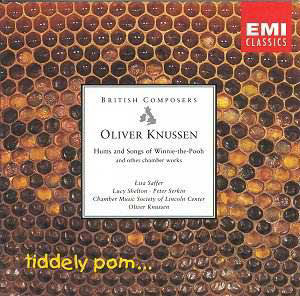This excellent and very generous collection was recorded in
the early nineties, when Knussen held the Elise L. Stoeger Composer’s
Chair of the Chamber Music Society of the Lincoln Center. In his concise
but typically informative introduction to the works, which is reprinted
in the booklet, he avoids in-depth analysis (probably wisely) in favour
of a background and general overview of each piece. In many cases, the
performers here are the dedicatees, and with Knussen in charge of the
project, including being producer, the whole disc has an unmistakable
air of authority.
Possibly the most familiar work here will be the Whitman
Settings, which featured (in their slightly later orchestral guise)
on the excellent 1996 DG disc of O.K.’s music. The soloist in both versions
is the superb Lucy Shelton, who more than makes up for the lack of texts
by giving us crystal clear diction and enunciation. She is partnered
by another Knussen regular, Peter Serkin, and a formidable partnership
they make. As the composer tells us, these characteristically powerful
but unusually short poems "muse on things in space or sky, and
all four songs grow out of the idea heard in the very first bar".
The titles give clues; When I first heard the learn’d astronomer;
A noiseless, patient spider; The Dalliance of the Eagles;
The voice of the Rain. The wide-ranging and sonorous, almost romantic,
piano accompaniment matches the typically visionary words from a poet
who has a long history of inspiring English composers. Lines such as
"I am the poem of Earth, said the voice of the rain, Eternal
I rise impalpable out of the land and the bottomless sea"
are treated to lavish textures – one can see why the composer felt the
need to orchestrate, but the intimacy here has its own unique power.
Shelton also features on Océan de terre,
which was composed in the winter of 1972-3, and is a setting of a French
surrealist poem by Apollinaire. Lack of texts this time makes appreciation
that much harder; the harmonies are quite dense and dissonant, with
the tension between two twelve-note chord blocks (based on the interval
of a fourth) creating layers of sound over which the voice floats. The
effect is ethereal and disturbing, and it would be nice to know what
is being expressed.
Peter Serkin also features again, once in Sonya’s
Lullaby, a short piano piece that grew out of sleepless nights created
by Knussen’s four-month-old daughter, and the Variations, a short
but highly charged piece dating from 1989. Knussen admits to the influence
of Stravinsky, Copland and Webern in this piece, particularly in the
integration of extreme contrasts and the expressive approach to very
limited raw material – the theme is itself a variation on its first
six notes. The virtuosity is thrilling, with Serkin’s technique stretched
but well able to cope with the severe demands of the piece.
The Rilke settings are tiny, terse pieces that are
aphoristic and again recall Webern, particularly in the way character
and texture are defined with extreme concision – silence is as important
as music. The marvellously whimsical Hums and Songs of
Winnie the Pooh is not a conventional text setting, though onomatopoeic
devices are employed. It is rather, as Knussen tells us "a sequence
of faded snapshots and reflections, by an unwilling grown-up, on things
remembered from the book, and on what those things meant to him as a
child … I allowed the music to take itself where it wanted to go".
Both works are entertaining, and superbly realised by Lisa Saffer.
The Songs without Voices is a collection of
short, self-contained compositions for flute, cor anglais, clarinet,
horn, violin, viola, cello and piano. Three of them are, literally,
songs without voice – that is, a complete poem ‘set’ syllable by syllable
for instruments in the course of a movement. The other is a more private
lyrical impulse – a cor anglais melody written upon hearing of the death
of Andrzej Panufnik, and sub-titled Elegiac Arabesques. The performance
is, needless to say, ideal in every respect.
So, all in all, an unmissable collection of short,
easily digestible but important items by one of the U.K.’s foremost
musical voices. It’s possible the disc has been issued to coincide with
O.K.’s fiftieth birthday, and, if so, is indeed something to celebrate.
Recording quality is in the demonstration bracket, and this has to be
counted as another highly desirable addition to the important British
Composers series.
Tony Haywood


